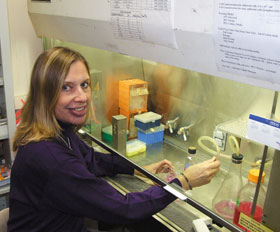Feature Story
As published in the UConn Advance, November 17, 2008.
Taking a Scientific Look at How Therapeutic Touch Affects Cells
By Carolyn Pennington

Gloria Gronowicz, professor of surgery, works with bone cell samples in her lab at the Health Center.
Photo by Carolyn Pennington
A study by a Health Center researcher takes a scientific look at a therapy that is often considered unscientific – hands-on healing.
Gloria Gronowicz, professor of surgery, found that Therapeutic Touch performed by trained energy healers significantly stimulated the growth of bone, tendon, and skin cells in lab dishes.
Her findings are published in the Journal of Orthopaedic Research and The Journal of Alternative and Complementary Medicine.
“Complementary medicine techniques have become increasingly popular for patients looking for alternative ways of healing or feeling better,” says Gronowicz, “but the effectiveness of many of these techniques has not been thoroughly studied scientifically.”
Therapeutic Touch, a disciplined multi-step process by which a practitioner generates energy through his or her hands to promote healing, is one of those practices.
In vitro study
Clinically, Therapeutic Touch has been shown to be effective in
relieving tension headaches, arthritis pain, and enhancing immune
function. But while there are numerous clinical studies on the
effects of Therapeutic Touch, there are few in vitro studies.
Gronowicz set out to determine whether the approach had any effect on bone cell growth, differentiation, and mineralization in vitro.
She used controlled experiments that could be rigorously analyzed with statistics. The experiments were conducted on healthy bone cells and on bone cancer cells.
The study involved dividing the bone cell cultures into three groups. Each group received genuine or sham treatment twice a week for 10 minutes each.
One dish of cells was treated by a trained Therapeutic Touch healer. Therapeutic Touch does not involve touching, but is a five-step process that involves placing the hands two to 10 inches away from the surface of the subject.
A second set of cells received a sham treatment — untrained students who were instructed to just hold their hands a few inches over the Petri dish.
The third dish of cells was left in its metal stand untreated. After each session, the dishes were returned to an incubator. Scientists who later examined the cells under the microscope did not know which group each dish had been in.
Faster growth
Gronowicz, who has a Ph.D. in cell biology and has spent much of her
career studying the biology of bone cells, was surprised by the
results.
“After the second week and four Therapeutic Touch treatments,” she says, “we did find a significant increase in DNA synthesis and mineralization in the bone cells treated by trained healers, compared to the cells that had not been treated or had sham treatments.”
Gronowicz tested the cells using several different biological markers for growth, and each test confirmed her findings.
“The TT-treated cells grew faster than the other cells,” she says. “In fact in one test, cells treated with TT grew at double the rate of untreated cells.”
In addition to seeing increased cell division under the microscope, Gronowicz observed that the bone cell cultures treated with Therapeutic Touch also absorbed more calcium, the essential mineral for growing strong bones.
The experiments on the bone cancer cells produced different results. Unlike the healthy cells, the bone cancer cells did not appear to be stimulated by the touch therapy.
“Therapeutic touch appears to increase DNA synthesis, differentiation, and mineralization in normal bone cells, and decrease differentiation and mineralization in a bone cancer derived cell line,” says Gronowicz.
That is actually a good thing, she adds. Since cancer occurs when cells grow out of control, a treatment that stimulates growth could be detrimental to people with cancer.
Gronowicz says more studies are needed to figure out how and why Therapeutic Touch seems to stimulate normal cell growth; whether the findings can be applied to patient care; and whether the findings begin to explain why some people with strong social support systems appear to be healthier and recover from disease better than those who don’t.


